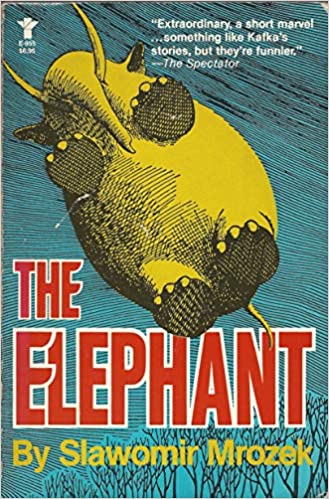Figure of Speech
Figure of Speech, word or
group of words used to give particular emphasis to an idea or sentiment. The
special emphasis is typically accomplished by the user's conscious deviation
from the strict literal sense of a word, or from the more commonly used form of
word order or sentence construction. From ancient times to the present, such
figurative locutions have been extensively employed by orators and writers to
strengthen and embellish their styles of speech and composition. A number of
the more widely used figures of speech, some of which are also called tropes,
follow.
Anticlimax,
sequence of ideas that abruptly diminish in dignity or importance at the end of a sentence or passage, generally for satirical effect. The following sentence contains an illustration of anticlimax: “Among the great achievements of Benito Mussolini's regime were the revival of a strong national consciousness, the expansion of the Italian Empire, and the running of the trains on time.” (Compare with climax, below.)
sequence of ideas that abruptly diminish in dignity or importance at the end of a sentence or passage, generally for satirical effect. The following sentence contains an illustration of anticlimax: “Among the great achievements of Benito Mussolini's regime were the revival of a strong national consciousness, the expansion of the Italian Empire, and the running of the trains on time.” (Compare with climax, below.)
Antithesis,
juxtaposition of two words, phrases, clauses, or sentences contrasted or opposed in meaning in such a way as to give emphasis to contrasting ideas. An example of antithesis is the following line by the English poet Alexander Pope: “To err is human, to forgive divine.”
juxtaposition of two words, phrases, clauses, or sentences contrasted or opposed in meaning in such a way as to give emphasis to contrasting ideas. An example of antithesis is the following line by the English poet Alexander Pope: “To err is human, to forgive divine.”
Apostrophe,
device by which an actor turns from the audience, or a writer from readers, to address a person who usually is either absent or deceased, an inanimate object, or an abstract idea. The English poet John Milton, in his poem Il Penseroso, invokes the spirit of melancholy in the following words: “Hail divinest Melancholy, whose saintly visage is too bright to hit the sense of human sight.”
device by which an actor turns from the audience, or a writer from readers, to address a person who usually is either absent or deceased, an inanimate object, or an abstract idea. The English poet John Milton, in his poem Il Penseroso, invokes the spirit of melancholy in the following words: “Hail divinest Melancholy, whose saintly visage is too bright to hit the sense of human sight.”
Climax,
arrangement of words, clauses, or sentences in the order of their importance, the least forcible coming first and the others rising in power until the last, as in the following sentence: “It is an outrage to bind a Roman citizen; it is a crime to scourge him; it is almost parricide to kill him; but to crucify him—what shall I say of this?” (Compare with anticlimax, above.)
arrangement of words, clauses, or sentences in the order of their importance, the least forcible coming first and the others rising in power until the last, as in the following sentence: “It is an outrage to bind a Roman citizen; it is a crime to scourge him; it is almost parricide to kill him; but to crucify him—what shall I say of this?” (Compare with anticlimax, above.)
Conceit,
an elaborate, often extravagant metaphor or simile (see below) making an analogy between totally dissimilar things. The term originally meant “concept” or “idea.” The use of conceits is especially characteristic of 17th-century English metaphysical poetry. An example occurs in the poem “A Valediction: Forbidding Mourning,” by the English poet John Donne, in which two lovers' souls are compared to the legs of drawing compasses.
an elaborate, often extravagant metaphor or simile (see below) making an analogy between totally dissimilar things. The term originally meant “concept” or “idea.” The use of conceits is especially characteristic of 17th-century English metaphysical poetry. An example occurs in the poem “A Valediction: Forbidding Mourning,” by the English poet John Donne, in which two lovers' souls are compared to the legs of drawing compasses.
Euphemism,
substitution of a delicate or inoffensive term or phrase for one that has coarse, sordid, or otherwise unpleasant associations, as in the use of “lavatory” or “rest room” for “toilet,” and “pass away” for “die.”
substitution of a delicate or inoffensive term or phrase for one that has coarse, sordid, or otherwise unpleasant associations, as in the use of “lavatory” or “rest room” for “toilet,” and “pass away” for “die.”
Exclamation,
sudden outcry or interjection expressing violent emotion, such as fright, grief, or hatred. Two illustrations of exclamation are the line in the English playwright William Shakespeare's drama Macbeth in which Lady Macbeth says, “Out, out, damned spot .... !” and the line in Shakespeare's tragedy Hamlet where the prince cries, “O villain, villain, smiling damned villain!”
sudden outcry or interjection expressing violent emotion, such as fright, grief, or hatred. Two illustrations of exclamation are the line in the English playwright William Shakespeare's drama Macbeth in which Lady Macbeth says, “Out, out, damned spot .... !” and the line in Shakespeare's tragedy Hamlet where the prince cries, “O villain, villain, smiling damned villain!”
Hyperbole,
form of inordinate exaggeration according to which a person or thing is depicted as being better or worse, or larger or smaller, than is actually the case, as in the sentence from an essay by the English writer Thomas Babington Macaulay: “Dr. Johnson drank his tea in oceans.” (Compare with litotes, below.)
form of inordinate exaggeration according to which a person or thing is depicted as being better or worse, or larger or smaller, than is actually the case, as in the sentence from an essay by the English writer Thomas Babington Macaulay: “Dr. Johnson drank his tea in oceans.” (Compare with litotes, below.)
Irony,
dryly humorous or lightly sarcastic mode of speech, in which words are used to convey a meaning contrary to their literal sense. An instance of irony is the suggestion, put forward with apparent seriousness by the English satirist Jonathan Swift in his “A Modest Proposal”, that the poor people of Ireland should rid themselves of poverty by selling their children to the rich to eat.
dryly humorous or lightly sarcastic mode of speech, in which words are used to convey a meaning contrary to their literal sense. An instance of irony is the suggestion, put forward with apparent seriousness by the English satirist Jonathan Swift in his “A Modest Proposal”, that the poor people of Ireland should rid themselves of poverty by selling their children to the rich to eat.
Litotes,
understatement employed for the purpose of enhancing the effect of the ideas expressed, as in the sentence “The English poet Thomas Gray showed no inconsiderable powers as a prose writer,” meaning that Gray was in fact a very good prose writer. (Compare with hyperbole, above.)
understatement employed for the purpose of enhancing the effect of the ideas expressed, as in the sentence “The English poet Thomas Gray showed no inconsiderable powers as a prose writer,” meaning that Gray was in fact a very good prose writer. (Compare with hyperbole, above.)
Metaphor,
use of a word or phrase denoting one kind of idea or object in place of another word or phrase for the purpose of suggesting a likeness between the two. Thus, in the biblical Book of Psalms, the writer speaks of God's law as “a light to his feet and a lamp to his path.” Other instances of metaphor are contained in the sentences “He uttered a volley of oaths” and “The man tore through the building.” (Compare with simile, below.)
use of a word or phrase denoting one kind of idea or object in place of another word or phrase for the purpose of suggesting a likeness between the two. Thus, in the biblical Book of Psalms, the writer speaks of God's law as “a light to his feet and a lamp to his path.” Other instances of metaphor are contained in the sentences “He uttered a volley of oaths” and “The man tore through the building.” (Compare with simile, below.)
Metonymy,
use of a word or phrase for another to which it bears an important relation, as the effect for the cause, the abstract for the concrete, and similar constructions. Examples of metonymy are “He was an avid reader of Chaucer,” when the poems of the English writer Geoffrey Chaucer are meant, and “The hostess kept a good table,” when good food is implied. (Compare with synecdoche, below.)
use of a word or phrase for another to which it bears an important relation, as the effect for the cause, the abstract for the concrete, and similar constructions. Examples of metonymy are “He was an avid reader of Chaucer,” when the poems of the English writer Geoffrey Chaucer are meant, and “The hostess kept a good table,” when good food is implied. (Compare with synecdoche, below.)
Onomatopoeia,
imitation of natural sounds by words. Examples in English are the italicized words in the phrases “the humming bee,””the cackling hen,””the whizzing arrow,” and “the buzzing saw.”
imitation of natural sounds by words. Examples in English are the italicized words in the phrases “the humming bee,””the cackling hen,””the whizzing arrow,” and “the buzzing saw.”
Oxymoron,
combination of two seemingly contradictory or incongruous words, as in the line by the English poet Sir Philip Sidney in which lovers are said to speak “of living deaths, dear wounds, fair storms, and freezing fires.” (Compare with paradox, below.)
combination of two seemingly contradictory or incongruous words, as in the line by the English poet Sir Philip Sidney in which lovers are said to speak “of living deaths, dear wounds, fair storms, and freezing fires.” (Compare with paradox, below.)
Paradox,
statement or sentiment that appears contradictory to common sense yet is true in fact. Examples of paradox are “mobilization for peace” and “a well-known secret agent.” (Compare with oxymoron, above.)
statement or sentiment that appears contradictory to common sense yet is true in fact. Examples of paradox are “mobilization for peace” and “a well-known secret agent.” (Compare with oxymoron, above.)
Personification,
representation of inanimate objects or abstract ideas as living beings, as in the sentences “Necessity is the mother of invention,””Lean famine stalked the land,” and “Night enfolded the town in its ebon wings.”
representation of inanimate objects or abstract ideas as living beings, as in the sentences “Necessity is the mother of invention,””Lean famine stalked the land,” and “Night enfolded the town in its ebon wings.”
Rhetorical
question,
asking of questions not to gain information but to assert more emphatically the obvious answer to what is asked. No answer, in fact, is expected by the speaker. The device is illustrated in the following series of sentences: “Did you help me when I needed help? Did you once offer to intercede in my behalf? Did you do anything to lessen my load?”
asking of questions not to gain information but to assert more emphatically the obvious answer to what is asked. No answer, in fact, is expected by the speaker. The device is illustrated in the following series of sentences: “Did you help me when I needed help? Did you once offer to intercede in my behalf? Did you do anything to lessen my load?”
Simile,
specific comparison by means of the words “like” or “as” between two kinds of ideas or objects. Examples of the simile are contained in the sentence “Christianity shone like a beacon in the black night of paganism” and in the line by the English poet William Wordsworth: “But, like a thirsty wind, to roam about.” (Compare with metaphor, above.)
specific comparison by means of the words “like” or “as” between two kinds of ideas or objects. Examples of the simile are contained in the sentence “Christianity shone like a beacon in the black night of paganism” and in the line by the English poet William Wordsworth: “But, like a thirsty wind, to roam about.” (Compare with metaphor, above.)
Synecdoche,
figurative locution whereby the part is made to stand for the whole, the whole for a part, the species for the genus, and vice versa. Thus, in the phrase “50 head of cattle,””head” is used to mean whole animals, and in the sentence “The president's administration contained the best brains in the country,””brains” is used for intellectually brilliant persons. (Compare with metonymy, above.)
figurative locution whereby the part is made to stand for the whole, the whole for a part, the species for the genus, and vice versa. Thus, in the phrase “50 head of cattle,””head” is used to mean whole animals, and in the sentence “The president's administration contained the best brains in the country,””brains” is used for intellectually brilliant persons. (Compare with metonymy, above.)








0 Comments